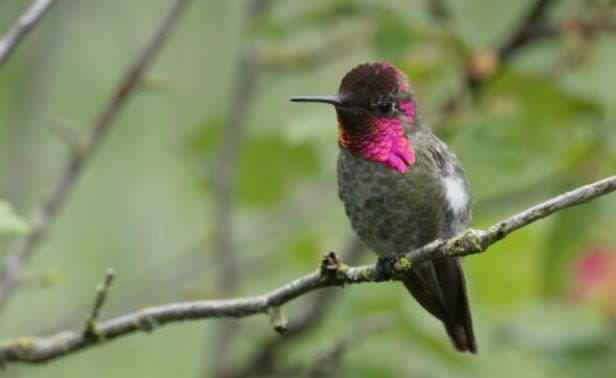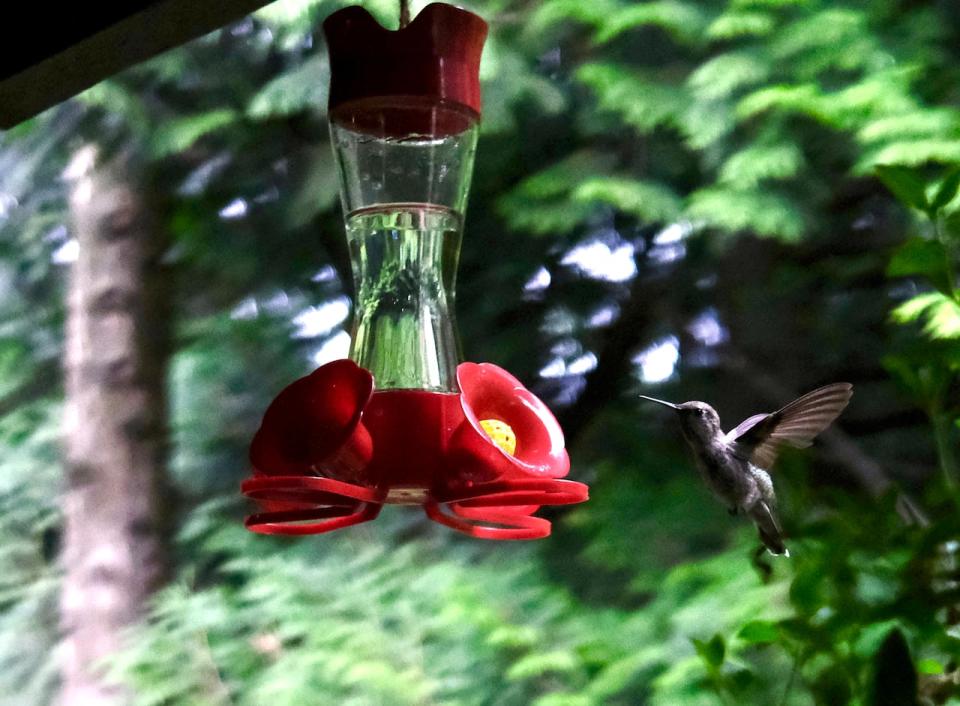Sugar shortage worrisome for B.C. hummingbird watcher

In the midst of a sugar shortage in Western Canada, hummingbird expert Alison Moran has her feathered friends in mind.
Moran is concerned the shortage — the result of an ongoing strike by unionized workers at the Rogers Sugar refinery in Vancouver — will put Anna's hummingbirds at risk.
She says Anna's hummingbirds rely heavily this time of year on the nectar people put in their bird feeders, and the vital ingredient in that nectar is white sugar.
"I'm sort of hoping that bakers will get creative this year and use other sources like syrup or honey or stevia or something like that and save their white sugar for their hummingbirds," Moran said in conversation with Gregor Craigie, host of CBC's On The Island.
Moran is a director for the Rocky Point Bird Observatory's Hummingbird Project. Based in Victoria, the project brings together citizen science teams to monitor and study the migratory, breeding and behavioural patterns of hummingbird species commonly found in Canada.
One of those species is the Anna's hummingbird, which originated in the Baja area of Mexico and is now a regular winter resident of southern Vancouver Island. Moran says Anna's hummingbirds do consume insects and tree sap but, without feeders to support a population that has been elevated by people feeding them, "quite a few" would die.
Anything but white sugar is 'problematic'
Moran also says this is a critical time of year for Anna's hummingbirds because they are starting to nest, and they choose locations where they can find an abundance of food.
Typically, that means close to feeders.

A hummingbird hovers at a backyard feeder in Burnaby, B.C. (Submitted by Brendan Carroll)
"They have made their decisions to nest based on just how generous we've been," Moran said.
Moran says using anything but white sugar as a sweetener in hummingbird nectar is "problematic."
"For example, brown sugar will give them iron poisoning," said Moran, adding that icing sugar, fruit sugars and honey are also bad for hummingbirds.
Moran says the correct mix for hummingbird nectar is one part white sugar to four parts water.
She also says it's important to put only the necessary amount of nectar into a feeder, and to keep the rest refrigerated until it is needed.
"Every time they dip their tongue in … they're inoculating [the nectar in the feeder] with microbes and it's going to go off. You can stretch it a lot longer if you only put out what you actually use and then clean your feeder and then refill from a clean stock in the fridge."
Strike ongoing for more than 10 weeks
Workers at the Rogers Sugar refinery have been on strike for more than 10 weeks after their employer demanded 12-hour shifts and 24/7 operations during contract negotiations.
The job action has resulted in bare sugar shelves in stores across Western Canada, and the sugar that can be found has soared in price.
"We've actually noticed that brown sugar is more expensive now by 15 per cent since mid-October," said Sylvain Charlebois, director of the Agri-Food Analytics Lab at Dalhousie University in Halifax, N.S.
"That's a lot. And white sugar is up almost 11 per cent."
Charlebois anticipates the strike being a long one.
"Most people think that we eat too much sugar, so why would people care about a sugar plant?" he said.
"I think this is probably going to last at least seven to eight months."


